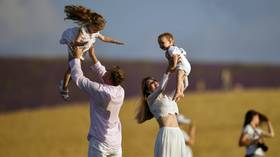Lockdowns should be LAST RESORT, but masks & social distancing could save 300K lives across continent, WHO European director says
The European director of the World Health Organization (WHO) has warned against using lockdowns to combat the novel coronavirus, arguing the policy is so bad for public health, it should be used only when “absolutely necessary.”
During a Thursday briefing, Hans Kluge, European director of the WHO, urged governments to enact “proportional” responses to the Covid-19 pandemic. He stressed that authorities should be cautious when it came to heavy-handed policies such as lockdowns. While there was certainly cause for “concern,” with cases having surged in several European countries that previously appeared to have the virus under control, it was imperative to avoid “panic” and not to overreact and impose draconian measures, he warned.
Also on rt.com Germany cracks down on parties, imposes curfew & stricter mask mandate as Merkel warns new measures may not be enoughKluge said “systematic and general mask-wearing” in public and private places, and “strict controls on social gatherings” could save 300,000 lives across Europe in the next six months. But national lockdowns should be “a last resort”, he cautioned, as they do more harm than good.
“We have to look at what I call the collateral damage – mental health, domestic sexual violence,” and other negative outcomes such as children falling behind in school, he said, as well as “very important microeconomic consequences” like massive unemployment and financial insecurity, arguing that focusing on Covid-19 cases alone risked overlooking greater harms.
One thing we learned from the corona crisis is it is hitting disproportionately the vulnerable.
Kluge warned that a narrow focus on the coronavirus risked missing the surge in deaths from cardiovascular disease, cancer, and other chronic conditions that might go undiagnosed or untreated due to the panic triggered by rising Covid-19 case numbers.He also called for “empathy and social dialogue,” pointing out that “in many countries, people are sick and tired of restrictive measures” – especially when they don’t appear to have the desired effect on halting the virus’s spread.
Kluge’s condemnation of the strict lockdowns that so many world leaders have embraced echoed the words of his colleague, WHO Special Envoy on Covid-19 David Nabarro, who has recently warned that lockdowns should not be used as the “primary means of control of the virus.”
Underlining that shutting down entire countries’ economies had “one consequence that you must never ever belittle, and that is making poor people an awful lot poorer,” he warned that if governments aren’t careful, the purported cure will end up being worse than the disease, and another round of iron-fisted lockdowns could trigger “a ghastly global catastrophe.”
Also on rt.com Doctors in Australia demand end to Victoria lockdown while WHO says restrictions should not be primary courseThe science on lockdowns and other ultra-strict virus control measures remains hotly contested. A survey by the International Committee of the Red Cross confirmed oft-cited claims that the mental health fallout of Covid-19 control policies has been massive, affecting as many as one in two people in countries as diverse as the UK, Philippines, Lebanon, and Switzerland. However, lockdown defenders have insisted the policy is the only way to safeguard the elderly and vulnerable.
If you like this story, share it with a friend!














